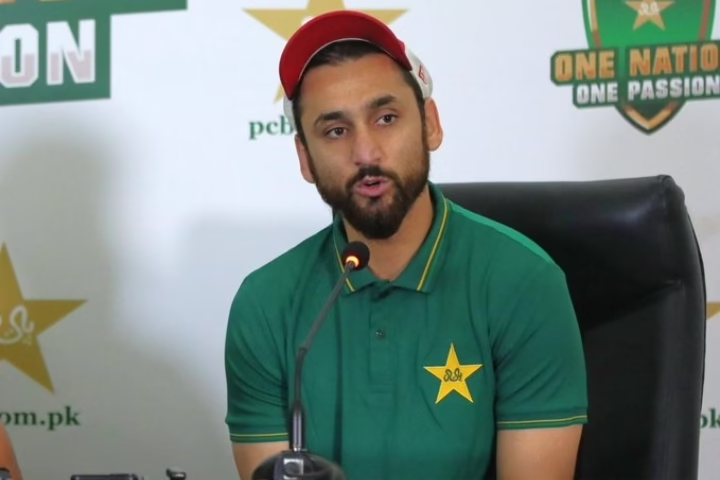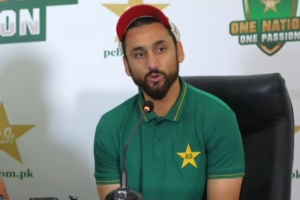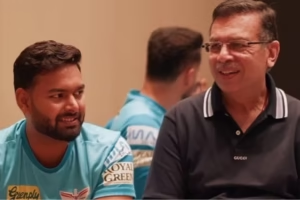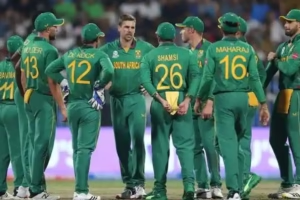Salman Ali Agha Vows ‘Fearless Cricket’ as New Pakistan T20I Captain Ahead of New Zealand Tour
By Smrati Khare


Pakistan Eyes a Bold New Era with Agha at the Helm, Rizwan and Babar Dropped for Poor Strike Rates, In a dramatic shift, Salman Ali Agha has been named Pakistan’s new T20I captain, replacing Mohammad Rizwan ahead of the white-ball tour of New Zealand. The Pakistan Cricket Board (PCB) aims to revamp the team’s approach after a disappointing T20 World Cup 2024 exit, emphasizing a high-risk, fearless brand of cricket.
The change comes after Pakistan’s outdated, conservative batting strategy failed to deliver results, prompting the exclusion of Rizwan and Babar Azam from the squad. The move signals a fresh start for Pakistan cricket, focusing on aggressive gameplay to compete with modern T20 standards.
Agha’s Vision: Intent, Aggression, and Risk-Taking Cricket
Speaking at a press conference in Lahore, Agha outlined his vision for Pakistan’s new approach, stressing the importance of intent and attacking mindset.
“We want to play fearless cricket, which naturally involves high risk. But in modern T20 cricket, taking risks is a necessity, not a choice. There will be failures, but the goal is to support our players and build confidence in this strategy,” Agha said.
With the T20 Asia Cup 2025 and the T20 World Cup 2026 on the horizon, PCB has placed its faith in Agha and vice-captain Shadab Khan, who is known for his aggressive style of play.
Major Exclusions: Babar Azam, Mohammad Rizwan, and Shaheen Afridi Dropped
One of the biggest talking points is the omission of senior players like Babar Azam, Mohammad Rizwan, and Shaheen Afridi from the T20I and ODI squads. While the PCB has not ruled out their return, chief selector and interim head coach Aaqib Javed made it clear that the team is prioritizing youth and aggressive cricket.
“We are aligning with modern T20 trends. Most top teams have separate squads for different formats, with an 80-90% personnel difference between Test, ODI, and T20 squads. Pakistan needs to adopt this model to compete at the highest level,” Aaqib explained.
A Shift Towards Domestic Performance-Based Selection
Aaqib also emphasized the importance of domestic cricket, urging senior players to prove themselves in local competitions before reclaiming a spot in the national team.
“Top players like Babar, Rizwan, and Shaheen play so much international cricket that they rarely participate in domestic red-ball and List A formats. But if they want to improve, they must go back and play. You can’t play 70% T20 cricket all year and expect to excel in Tests or ODIs,” Aaqib remarked.
The changes also see Haris Rauf missing from the ODI squad, reinforcing PCB’s intent to overhaul Pakistan’s squad with in-form domestic performers.
Pakistan’s New T20 Approach: A 20-25 Player Pool for the Future
Both Agha and Aaqib stressed the need to develop a stable core of 20-25 players to back over the next 18 months, ensuring consistency in team selection.
Aaqib also acknowledged the instability within Pakistan cricket, pointing out that 16 coaches and 26 selectors have changed in the last two years—a major reason behind the team’s inconsistent performances.
“No team in the world can succeed with this level of instability. Until we get consistency in leadership, from the chairman down to the coaching staff, Pakistan will struggle to progress,” he stated.
What’s Next for Pakistan?
As Pakistan gears up for their T20I series against New Zealand, all eyes will be on Salman Ali Agha’s leadership and whether this high-risk approach can finally make Pakistan a force to be reckoned with in T20 cricket.
Will this bold, fearless style of play be the solution to Pakistan’s struggles, or will the absence of experienced players hurt their performance?
Stay tuned for all Pakistan vs New Zealand match updates, squad analysis, and breaking news, only on Cricadium!
You might also like
Recommended to you














